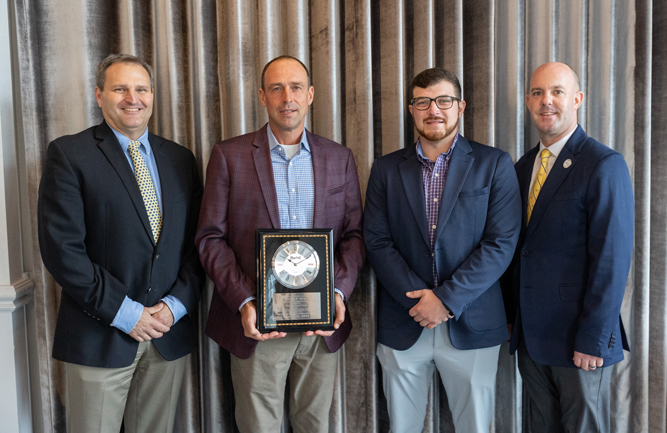Georgia group funds water-saving research
HARTWELL, GA — The Georgia Golf Environmental Foundation will invest more than $23,000 in research projects, further advancing the game’s drive toward sustainability. The foundation recently announced it would help fund two water conservation projects for scientists at the University of Georgia. The state’s golf industry delivers a direct economic impact of $2.4 billion annually.
“We are very excited about both projects,” says Foundation Chairman Tim Cunningham, certified golf course superintendent at Coosa Country Club in Rome, GA. “Down the road, we expect they will each generate findings to really help the golf course superintendent be more effective and more efficient, both economically and environmentally.”
The projects to be supported by the Georgia Golf Environmental Foundation were chosen from a total of seven proposals submitted by researchers. One of the successful bids will investigate promising leads that naturally occurring enzymes can improve the ability of problematic soils to absorb water. Current methods of combating water repellant, or hydrophobic, soil can be costly and require repeated efforts.
The second project also could lead to more efficient water use by examining the impact of mowing height and soil moisture levels on Bermudagrass, by far the dominant golf course turf cover in the state and across much of the Southeast. UGA researchers say they will be the first to study the impact of both elements simultaneously, which could offer critical findings. Mowing, the most basic cultural practice on a golf course, can have a major impact on a plant’s water use efficiency because it slows root growth, increases water loss from cut leaf ends and hinders a plant’s ability to produce and store food.
“When you consider the acreage of bermudagrass on the 400-some golf courses in our state and how often it is mowed, you have to think any degree of improvement will bring significant benefits,” Cunningham says. “Golf course superintendents always strive to produce the best possible conditions with the least amount of effort and inputs because those are the elements which generate the costs in the game. That’s why both of these research projects are so promising.”
Cunningham says that while the Georgia Golf Environmental Foundation has provided research money before, this year’s grants represent a major step forward because of the amount of consultation with superintendents. Members of the Georgia Golf Course Superintendents Association were first surveyed to isolate their most pressing challenges that research might resolve. The findings were shared with researchers who then submitted their proposals, which were further refined by consultation with the GGEF’s research committee.
“This process gives us the best possible chance of securing information that will benefit golf course superintendents across the state on a day-to-day basis,” Cunningham says. “Sometimes in the past, research generated outcomes that may have been geared more to turfgrass in general, such as home lawns or sports fields, and maybe some of it was helpful for golf. Now, I think we will see that money raised by the foundation will benefit golf primarily.”
The GGEF is funding “Preliminary Field Studies on Enzyme Technology to Alleviate Soil Water Repellency in Turfgrass Situations” at $2,500 in 2012, 2013 and 2014, for a total of $7,500 over three years. Principal investigators working on the project are Robert N. Carrow, Qingguo Huang and Paul L. Raymer, from the University of Georgia, Griffin campus.
“Morphological and Physiological Response of Bermudagrass to Soil Moisture and Mowing Height” will be funded at a first-year cost of $9,075, with $6,655 to follow in the second year for a two-year total of $15,730. Gerald M. Henry and Jared A. Hoyle, from the UGA Department of Crop and Soil Sciences, will lead the project.
Established in 2004, the Georgia Golf Environmental Foundation promotes sustainable environmental stewardship in golf and is the philanthropic arm of the Georgia Golf Course Superintendents Association. It is funded completely from golf industry efforts including Rounds 4 Research, a public online auction of tee-times donated by golf facilities. For more information on Rounds 4 Research and upcoming auction dates, see www.rounds4research.com.












